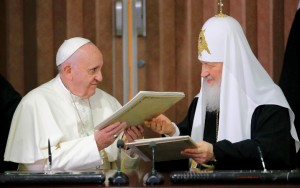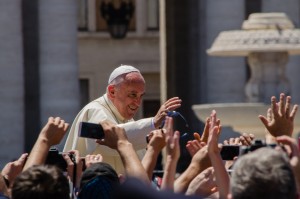
Credit: Gregorio Borgia / AP
‘Look who’s talking’ is a colloquial way of saying that even an unimpeachable idea may be compromised by the speaker’s personality.
For example, few would argue against the notion of the sanctity of human life – but even fewer would like to hear this argument put forth by a serial murderer. Or else, yes, children must be loved, but we wouldn’t like to receive this unassailable truth from a head master who sexually abuses his 11-year-old pupils.
It’s in this context that we ought to evaluate some of the statements made at the supposedly historic meeting between Pope Francis and Patriarch Kirill, head of the Russian Orthodox Church (ROC).
The meeting fell short of its claim to being the first step towards reconciliation between the Western and Eastern Churches. While the Pope is unquestionably head of the Catholic Church, Kirill presides over only one of the five Eastern patriarchates.
After the 1054 East-West split, the Pope (the bishop of Rome) has been recognised as head of the Church by Western Christians and as a ceremonial primus inter pares by the others. The Moscow patriarchate – and this is a burr under the ROC’s blanket – still ranks only fifth in the pecking order, while the honorary primacy of the Eastern Church rests with Constantinople.
The 16th-century idea of Moscow being some sort of third Rome (“and there will not be a fourth”) had more to do with the imperial ambitions of a neonatal Russia than with any valid doctrinal claim. Today’s cynical Russians mock that notion by saying “Not third Rome but third world”, which is a funny spoonerism: in Russian ‘Rome’ (Rim) is ‘world’ (mir) spelled backwards.
Such cynics are no longer to be found within the ranks of the Russian government or indeed the ROC, which is essentially the same body. Regardless of how much, if any, faith members of either setup have, ‘third Rome’ serves as the embodiment of secular Russian imperialism, fronted at present by Putin’s KGB junta.
What many Western observers don’t realise is that the ROC hierarchy (as distinct from the rank and file) isn’t so much an ecclesiastical body as a department of the KGB. Those Russian priests who wouldn’t act in that capacity didn’t survive the pre-war years, when 130,000 of them were arrested and 95,000 of those murdered.
This goes to show why the Pope’s attending the Havana love-in with the Patriarch was so ill-advised. Not to cut too fine a point, Francis is a free agent while Kirill is a KGB agent, as any reader of The Mitrokhin Archives will know.
Known in the KGB annals as ‘agent Mikhailov’, Vladimir Gundiayev, who upon his accession took the name Kirill, is a life-long agent carrying out both intelligence and propaganda assignments. The KGB documents cited by Mitrokhin invariably state that agent Mikhailov fulfilled his task successfully.
His task this time around was not to reconcile the Churches after the 1054 split but to use the global respect commanded by the papacy to legitimise Putin’s kleptofascist regime in the eyes of the world.
Under his loyal guidance, Kirill’s Church unfailingly supports every crime committed by Putin’s junta, be that the massacre of Chechnya, the aggression against Georgia, the theft of the Crimea, the subsequent attack on the Ukraine or the current butchery of Syrian schools and hospitals. More and more the slogan ‘Our Antioch’ is harmonised with ‘Our Crimea’ in Russian propaganda – and the ROC tows the line with canine devotion.
Its true allegiance comes across in the joint statement issued by the two prelates. It was probably written by the Metropolitan Hilarion, head of the ROC’s foreign department. (When I talked to him last year, it turned out we grew up in the same Moscow neighbourhood.)
To be sure, the statement includes all the good stuff from which no Christian would demur: support for marriage as a union of man and woman; opposition to abortion and euthanasia; empathy for victims of persecution; commitment to protecting Middle Eastern Christians and Christian proselytism.
But interspersed with the good stuff is subtle vindication of Putin’s aggression against the Ukraine: “We deplore the hostility… [and] invite our Churches in Ukraine… to refrain from taking part in the confrontation…”
But the situation in the Ukraine has nothing to do with a confrontation between the Churches. Ukrainian Catholics, uniates and members of the Ukrainian Orthodox Church all support their country’s government. Blessed by the ROC, the ‘confrontation’ was initiated by Putin’s shock troops, among whom church attendance is probably even lower than the Russian average of less than one per cent.
Ukrainian Churches of any confession have a sacred duty to oppose aggression against their country. This isn’t ‘taking part in the confrontation’ but providing Christian guidance to the communicants, many of whom are dying in defence of their nation.
Yet it wasn’t just the content of the meeting but the very fact that the Pope had agreed to it that’s so upsetting. The get-together was a strategic success for the KGB patriarch, yet a moral fiasco for the Catholic primate, who implicitly lent his authority to a criminal regime and its mock-ecclesiastical branch.








Comments